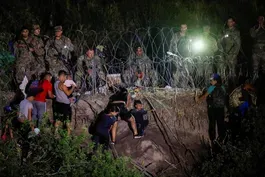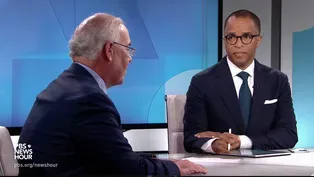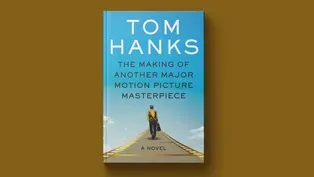
Man who put Jordan Neely in fatal chokehold released on bond
Clip: 5/12/2023 | 7m 48sVideo has Closed Captions
Man who put Jordan Neely in fatal chokehold released on bond after manslaughter arrest
Daniel Penny, the Marine veteran who put Jordan Neely in a fatal chokehold on a New York City subway was charged with second-degree manslaughter. Penny surrendered to police Friday and was released on bond. The killing touched off protests in New York over policing and a lack of support from the city for those who are homeless and mentally ill. Geoff Bennett discussed more with Errol Louis.
Problems with Closed Captions? Closed Captioning Feedback
Problems with Closed Captions? Closed Captioning Feedback
Major corporate funding for the PBS News Hour is provided by BDO, BNSF, Consumer Cellular, American Cruise Lines, and Raymond James. Funding for the PBS NewsHour Weekend is provided by...

Man who put Jordan Neely in fatal chokehold released on bond
Clip: 5/12/2023 | 7m 48sVideo has Closed Captions
Daniel Penny, the Marine veteran who put Jordan Neely in a fatal chokehold on a New York City subway was charged with second-degree manslaughter. Penny surrendered to police Friday and was released on bond. The killing touched off protests in New York over policing and a lack of support from the city for those who are homeless and mentally ill. Geoff Bennett discussed more with Errol Louis.
Problems with Closed Captions? Closed Captioning Feedback
How to Watch PBS News Hour
PBS News Hour is available to stream on pbs.org and the free PBS App, available on iPhone, Apple TV, Android TV, Android smartphones, Amazon Fire TV, Amazon Fire Tablet, Roku, Samsung Smart TV, and Vizio.
Providing Support for PBS.org
Learn Moreabout PBS online sponsorshipGEOFF BENNETT: We return now to the death of Jordan Neely on the New York City subway last week.
Daniel Penny, the former Marine accused of putting Neely in a choke hold for several minutes before he died, surrendered to police today and was released on bond.
Witnesses say, on May 1, Neely got on the train acting erratically.
They say he was shouting at passengers, but there are no reports that he physically attacked anyone.
Then, video shows Penny wrapping his arms around Neely's neck, forcing him to the ground.
Witnesses say he held him there until Neely stopped breathing.
Daniel Penny's attorney spoke to reporters today outside the police station.
THOMAS KENNIFF, Attorney For Daniel Penny: This morning, Daniel Penny surrendered at the Fifth Precinct at the request of the New York County district attorney's office.
He did so voluntarily and with the sort of dignity and integrity that is characteristic of his history of service to this grateful nation.
GEOFF BENNETT: At a separate news conference, the family of Jordan Neely said he had a history of mental illness and posed no threat.
They demanded the charges be raised from manslaughter to murder.
LENNON EDWARDS, Attorney For Family of Jordan Neely: Daniel Penny chose, intentionally chose a technique to use that is designed to cut off air.
That's what he chose.
And he chose to continue to hold that choke hold minute after minute, second after second, until there was no life left in Jordan Neely.
GEOFF BENNETT: The killing has touched off widespread protests in New York over policing and a lack of support from the city for those who are homeless and mentally ill. To unpack all this, we're joined by Errol Louis.
He hosts "Inside City Hall" on New York One and is a columnist for "New York Magazine."
Errol, it is good to have you here.
And, look, it took two weeks for the Manhattan DA, Alvin Bragg, to bring charges in this case.
Was that because the investigation took that long, or was this a response of -- or was this a response to two weeks of public pressure?
ERROL LOUIS, New York 1: Well, it's always hard to say whether public pressure makes a difference, but I can tell you for sure the district attorney's office had a lot of work to do in this investigation.
That video is compelling, a compelling piece of evidence.
But it's not the only piece of evidence.
They tried to round up every last person they could find who was on that subway car and tried to interview them and get all kinds of different information and evidence and put it all together before making a decision about whether or not to move forward.
So it wasn't entirely clear that a crime had been committed or who had done it or what the circumstances were.
So, in some ways, they're moving at a pretty fast clip under the circumstances.
GEOFF BENNETT: Yes.
And this case brings new focus to issues of race and crime and mental illness and homelessness.
There are people who say that Daniel Penny was a good samaritan who jumped into action when Jordan Neely was shouting about how he was hungry and tired and how he didn't want to live anymore and didn't care if he went to jail.
And there are others who say that this case represents the worst form of vigilantism.
How is this dividing the city?
ERROL LOUIS: Yes, well, it's really right along those lines.
I mean, like, take the term vigilantism, which is being thrown around.
Well, that requires the commission of a crime.
A vigilante is somebody who stops a crime under their own authority, rather than under the color of law.
But throwing your jacket down on a train and yelling is not a crime.
Saying that you're hungry and that you're despairing, you're thirsty, you don't care what happens to you, that's not a crime either.
You could offer the man a sandwich.
You could offer him a couple of dollars.
You don't necessarily have to throw him in a choke hold.
And so that's the kind of conversation that's happening in New York right now.
What do we owe to our neighbors, those among us who are in distress, who may have an addiction problem, who may have a mental health or emotional disability?
Do we owe them more than just physical force and treating them like an outcast or criminal?
Or can we do a little bit better?
GEOFF BENNETT: Well, on that point, you wrote a column for "New York Magazine" with a headline that just stopped me in my tracks.
The headline was: "Jordan Neely Was Already Dead."
And what you meant was that he was socially dead, that to be Black, homeless and destitute in New York City, that he was an outcast.
He was an outsider.
Tell me more about that and what it all says about the city's social safety net.
ERROL LOUIS: Sure.
Well, Geoff, a long time ago, I took a course with a man named Orlando Patterson, who really did a masterful work called "Slavery and Social Death."
And he surveyed societies across many millennia all over the world, Asia, Europe, Africa, everywhere.
And, really, what he came up with was this concept of social death.
And it reminded me of how we treat some people in our own modern society.
The concept has not gone away, which is that certain people are just considered outside the circle of care and concern.
They are socially dead.
What happens to them is of considerably less concern to the rest of us.
And that is really what we do every time we're walking past somebody like a Jordan Neely, who's in clear distress and asking for our help.
So there was some graffiti scrawled in the subway near the scene where he died saying: "Who killed Jordan Neely?"
And, to a certain extent, the answer is all of us.
GEOFF BENNETT: Errol, I spoke with New York Mayor Eric Adams on this program some months ago about his plan to address homelessness and combat crime.
Is any of that showing results?
ERROL LOUIS: Well, we have seen some numbers that are really quite impressive.
The number of cops was doubled and then I think tripled.
A lot of overtime has been spent.
A lot of cops are down in the subways.
The number of arrests has more than doubled.
The number of crimes have plummeted.
So,yes, that response has yielded results.
What it has not done, though, is dealt with people who are in need, who are perhaps disorderly, who perhaps are homeless, because you cannot arrest somebody -- you cannot arrest your way out of those problems.
Arresting somebody doesn't get them an apartment.
It doesn't get them addiction treatment.
It doesn't get the mental health counseling or whatever other assistance they might need.
And that has been sort of the stubborn remnants of a policing approach that some people have condemned as the wrong tool for the current situation.
And it's really both/and.
You certainly don't want pickpockets and muggers running around in the subway plying their trade.
But you also don't necessarily want to apply an anti-crime policing approach to people who need a different kind of a help.
And Jordan Neely is a perfect example of that.
He spent 18 months on Rikers Island in the custody of New York City.
And he comes out and, a few months later, we have the tragedy that has unfolded here that we have been talking about.
GEOFF BENNETT: What happens next in this case, Errol?
ERROL LOUIS: Mr. Penny is going to be back in court in July.
He's free on bond right now.
He cannot leave the state.
He has surrendered his passport.
He is a suspect in an important case.
An indictment will very likely follow.
When he comes back in July, we will have that - - he will have received a lot of information from the district attorney about the evidence that they have collected, the investigation that they have conducted.
And he will be in a better position to assess whether or not he wants to either change his plea, strike a deal, or go to trial.
Those are pretty much the choices that he has in front of him.
GEOFF BENNETT: Errol Louis is the host of "Inside City Hall" on New York 1 and a columnist for "New York Magazine."
Thanks so much for being with us.
ERROL LOUIS: Thank you, Geoff.
Border stays calm but new asylum policies lead to confusion
Video has Closed Captions
Clip: 5/12/2023 | 6m 27s | Southern border stays calm but confusion builds as new asylum policies take effect (6m 27s)
Brooks and Capehart on border policy, debt ceiling debate
Video has Closed Captions
Clip: 5/12/2023 | 10m 24s | Brooks and Capehart on U.S. border policy and debt ceiling negotiations (10m 24s)
Public health questions remain as COVID emergency ends
Video has Closed Captions
Clip: 5/12/2023 | 8m 50s | Public health questions remain as COVID emergency ends (8m 50s)
Tom Hanks discusses his debut novel
Video has Closed Captions
Clip: 5/12/2023 | 7m 55s | Tom Hanks on his debut novel, 'The Making of Another Major Motion Picture Masterpiece' (7m 55s)
Turkey prepares for election as Erdogan tries to hold power
Video has Closed Captions
Clip: 5/12/2023 | 6m 2s | Turkey prepares for consequential election as Erdogan struggles to maintain power (6m 2s)
Providing Support for PBS.org
Learn Moreabout PBS online sponsorshipSupport for PBS provided by:
Major corporate funding for the PBS News Hour is provided by BDO, BNSF, Consumer Cellular, American Cruise Lines, and Raymond James. Funding for the PBS NewsHour Weekend is provided by...















